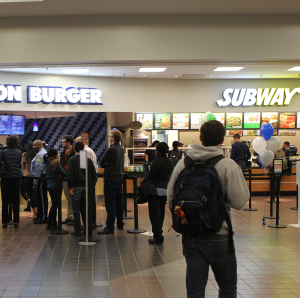
Following December’s trial run of the meal exchange program at Hoya Court, Aramark is evaluating the business implications of implementing a full-scale program in the future.
After months of planning by Auxiliary Services and Aramark, a trial run was held in early December, allowing students to use their meal swipes at Elevation Burger, Subway and Salad Creations at Hoya Court from Dec. 8 to Dec. 13.
Aramark Marketing Manager Adam Solloway said that the pilot program was well received by students.
“Overall, the meal exchange pilot was positively received. There were some ups and downs for us and for students, but most students who participated in the pilot seemed to be happy,” Solloway wrote in an email to The Hoya.
According to Solloway, Aramark observed that the staff at Hoya Court were quick to adapt to the sudden influx of customers.
“There was a significant increase in business that was unusual for the team at that time of the day,” Solloway wrote. “The Hoya Court team was very dedicated and executed the pilot program successfully in what was unchartered territory.”
Solloway said he could not provide specific details about the cost of the program or the revenue made from the pilot program.
“We are analyzing the business impact from the pilot,” Solloway wrote. “There are many financial and operational logistics that need to be factored into implementing any meal exchange program.”
In particular, he cited various problems from the pilot program that need to be rectified such as accounting for service speed.
“There is a significant financial impact that needs to be mitigated in order to successfully implement the program. It is also important to keep in mind that there are thousands of non-meal plan customers on campus, making the speed of service and operational capacity aspects challenging to resolve,” Solloway wrote.
GUSA Secretary for Dining and Auxiliary Services Nicolette Brownstein (SFS ’17) has worked with Auxiliary Services to create a permanent program, agreed that while a full-scale meal exchange program is desirable, there are several issues that must first be resolved.
“It’s something that we all want to happen. It’s something that I think the auxiliary and dining people really want to happen,” Brownstein said. “They are very receptive to and interested in [the program] personally.”
Although students can currently exchange meals at the on-campus Einstein Bros., after a student initiative spearheaded by GUSA in 2013 approved the meal exchange at the bagel stores, students are excited by the potential for more options. Ken Nunnenkamp (MSB ’16) echoed Brownstein’s interest in implementing the program in the future.
“I think that’d be awesome. I don’t have a meal plan as a junior, but I would buy a meal plan for that,” Nunnenkamp said.
However, Adam Shinbrot (COL ’18) said that Aramark should make certain adjustments for the full-scale program.
“I think they would definitely need to restructure certain things, but it’s definitely manageable,” Shinbrot said. “I also think they should expand the options. It shouldn’t be just a six-inch sub. That was absurd.”



















